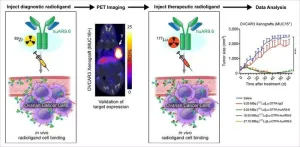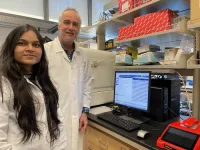(Press-News.org) The Lancet: Prostate cancer cases expected to double worldwide between 2020 and 2040, new analysis suggests
Annual prostate cancer cases are projected to rise from 1.4 million in 2020 to 2.9 million in 2040, and annual deaths to increase by 85% to almost 700,000 over the same timeframe, mainly among men in low-and middle-income countries (LMICs).
The Lancet Commission on prostate cancer argues that the ‘informed choice’ programme for prostate cancer screening with PSA testing, which is common in high-income countries (HICs), may lead to over-testing and unnecessary treatment in older men, and under-testing in high-risk younger men. The authors advocate instead for early-detection programmes for those at high risk.
The Commission also calls for urgent implementation of programmes to raise awareness of prostate cancer and for improvements in early diagnosis and treatment in LMICs – where most men present with late-stage disease.
More research involving men of different ethnicities, especially those of West African descent, are needed, as current knowledge of prostate cancer is largely based on studies of White men.
Cases of prostate cancer are projected to double from 1.4 million per year in 2020 to 2.9 million per year by 2040, with low- and middle-income countries (LMICs) predicted to see the highest increases in cases, according to The Lancet Commission on prostate cancer which will be launched by a presentation at the European Association of Urology Congress.
The number of annual prostate cancer deaths worldwide is predicted to rise by 85% over the 20-year period, from 375,000 deaths in 2020 to almost 700,000 deaths by 2040. The true numbers will likely be much higher than the recorded figures due to under-diagnosis and missed opportunities for data collection in LMICs.
Most of these deaths are expected to be in LMICs, due to the rising number of cases and increasing mortality rates in these countries. Deaths from prostate cancer have declined in most high-income countries (HICs) since the mid-1990s.
Prostate cancer is already a major cause of death and disability, accounting for 15% of all male cancers. It is the second most common cause of cancer deaths in UK men and the most common form of male cancer in more than half of the world’s countries.
Ageing populations and increasing life expectancy will lead to higher numbers of older men in coming years. As the main risk factors for prostate cancer – such as being aged 50 or older and having a family history of the disease – are unavoidable, it will not be possible to prevent the upcoming surge in cases through lifestyle changes or public health interventions.
Professor Nick James, lead author of the Commission, Professor of Prostate and Bladder Cancer Research at The Institute of Cancer Research, London, and Consultant Clinical Oncologist at The Royal Marsden NHS Foundation Trust, said: “As more and more men around the world live to middle and old age, there will be an inevitable rise in the number of prostate cancer cases. We know this surge in cases is coming, so we need to start planning and take action now. Evidence-based interventions, such as improved early detection and education programmes, will help to save lives and prevent ill health from prostate cancer in the years to come. This is especially true for low- and middle-income countries which will bear the overwhelming brunt of future cases.”
Global need for new and improved early detection programmes
In HICs, screening for prostate cancer often involves the PSA test, a blood test that measures levels of a protein called prostate-specific antigen (PSA). However, PSA tests often detect prostate cancer which may never cause symptoms and needs no treatment. The current approach to prostate cancer diagnosis in the UK and many other HICs relies on ‘informed choice’ PSA testing – when men aged 50 or over with no disease symptoms can request a PSA test from their doctor after a discussion of the risks and benefits. The Commission argues there is evidence to suggest this approach leads to over-testing in low-risk older men but does not increase detection of prostate cancer in younger men at higher risk. [1] The authors also highlight huge variations in the likelihood of men being diagnosed with advanced prostate cancer with the 'informed choice’ PSA testing strategy, for example The National Prostate Cancer Audit in the UK found that in 2022, 1 in 8 men (12.5%) with prostate cancer are diagnosed with advanced prostate cancer in London, whereas in Scotland more than 1 in 3 (35%) were diagnosed late. [2]
Instead, the authors recommend using MRI scans in combination with PSA testing to screen men at high risk of prostate cancer in HICs, such as those with a family history of the disease, those of African origin and those carrying the BRACA2 mutation. They argue that this approach would both reduce over-diagnosis and over-treatment, while detecting potentially lethal disease. MRI is effective in imaging cancers and can be used to provide information as to whether the disease is aggressive and likely to be life-threatening. However, biopsies are more effective at identifying aggressive cancers, so MRI alone should not be used to investigate men at high risk of disease.
The effectiveness of population-level PSA testing has not been tested in LMICs and there is an urgent need for cancer screening trials in these countries. New approaches to enable earlier diagnosis in LMICs are vital, as most men in these countries present with metastatic cancer – an advanced form of disease where the cancer has spread to other parts of the body, often the bones. Men with late-stage prostate cancer are much less likely to survive for a long period of time than those who are diagnosed early.
“With prostate cancer we cannot wait for people to feel ill and seek help – we must encourage testing in those who feel well but who have a high risk of the disease in order to catch lethal prostate cancer early. Pop-up clinics and mobile testing offer cost-effective solutions that combine health checks and education. In the UK we recently trialled a new innovative outreach programme called The Man Van which provided free health checks – including PSA tests – to high-risk men in London aged 45 and over. By bringing a van with quick and easy testing straight to men at work and in the community, and targeting those who have a higher risk of prostate cancer, we provided thousands of health checks which resulted in almost 100 cancer diagnoses in men who might otherwise have only seen a doctor once their cancer has progressed to a more advanced stage. The mix of education, outreach, testing and referral used in The Man Van trial may also be successful in LMICs and we hope to see similar initiatives rolled out globally to improve early detection of prostate cancer,” said Professor Nick James (also project lead for the 'Man Van'). [3]
As well as being a major growing challenge, prostate cancer is also an indicator of a wider need to tailor future healthcare to cope with increases in several diseases, as the numbers of men reaching middle and old age increase worldwide. The Commission calls for trials of prostate cancer screening in LMICs to form part of holistic approaches with a broader focus on men’s health.
Raising awareness of advanced prostate cancer and available therapies
There is a need to raise awareness of the dangers and symptoms of metastatic prostate cancer among men and their families in LMICs. Public awareness of the key features of advanced prostate cancer – such as bone pain, caused by metastatic disease – is poor in many LMICs. Similarly, there is generally low public awareness that treatments can prolong survival and decrease suffering – including cheap, effective ones such as hormone therapy – are available in many LMICs. As with early diagnostic capacity, there is a need to scale-up availability and improve access to treatments for advanced disease in LMICs.
Improving education about the disease is critical, and the Commission authors suggest that programmes should involve new technologies and channels such as smartphones, social media, and influencers. They highlight Project PINK BLUE, an organisation that delivers a range of programmes to raise awareness of breast, cervical, and prostate cancer in Nigeria, and provides free cancer screening. Many of Project PINK BLUE’s programmes utilise digital technologies and involve well-known public figures and celebrities.
Professor James N’Dow, Chair in Surgery, University of Aberdeen and Founder of Horizons Trust & Horizons Clinic, Gambia, said: “The issue in low- and middle-income countries is that late diagnosis of prostate cancer is the norm. Improved outreach programmes are needed to better inform people of the key signs to look out for and what to do next. Implementing these in tandem with investments in cost-effective early diagnostic systems will be key to preventing deaths from prostate cancer as cases inevitably rise with a global ageing population.”
He continues, “As well as the obvious direct effects on individual men’s health, rising numbers of cases and deaths from prostate cancer could have huge economic and social impacts on families in LMICs. Men in these countries are very often a family’s main breadwinner, so if they die or become seriously ill, this can lead to families facing major economic hardship. By preparing now for the upcoming surge in prostate cancer cases, with a particular emphasis on improved education and earlier diagnosis programmes, many of these harms could be reduced substantially.”
Building capacity to diagnose and treat prostate cancer early in LMICs
Optimal management of prostate cancer requires the availability of specialist staff and infrastructure to support diagnosis, surgery and radiotherapy to treat localised prostate cancer, and radiotherapy and hormone therapy for metastatic disease.
A major barrier to improved prostate cancer care in LMICs is a lack of trained staff and specialist facilities. These shortages are not limited to prostate cancer, and the 2015 Lancet Commission on Surgery found that 9 out of 10 people in LMICs cannot access basic surgical care. [4]
Expanding early diagnostic capabilities in LMICs will increase the rates of detection of early-stage prostate cancer, further increasing demand for surgery and radiotherapy. Urgent measures are therefore needed to build surgical and radiotherapy capacity in these countries. The Commission authors state that establishing regional hubs could provide the infrastructure needed to increase specialist training and improve patient access to radiotherapy and surgery.
For men with metastatic disease, earlier diagnosis and starting hormone therapy earlier will reduce deaths and prevent serious complications like painful spinal cord compression and urinary retention, which can lead to infection and kidney damage.
More research is needed on ethnic inequities in care and survival
The Commission authors highlight the need for more research to better understand prostate cancer in men who are not of White European origin, to enable improved detection and care in these groups. Research and knowledge of prostate cancer is heavily focussed on White European men, and most studies have been done in HICs. However, Black men, especially those of West African descent, have a higher risk of developing prostate cancer than White or Asian men, though the reasons for this are unclear. There is also a higher death rate from prostate cancer among Black men, but it is not known if this is driven by the differences in case rates or by other factors such as differing disease biology or societal factors such as deprivation or racism. More data is needed to identify the driving factors behind these trends.
The Commission authors call for mandatory recording of ethnicity in clinical trials, and that trials should reflect the ethnic mix of the populations being studied to ensure that the findings apply to all groups. The Commission authors also call for trials examining prostate cancer screening, early diagnosis, and treatment in LMICs.
NOTES TO EDITORS
A full list of The Lancet Commission on Prostate Cancer authors and their institutions is available in the report.
The Commission will be launched at the 39th Annual EAU Congress (EAU24) on Saturday 6th April.
Quotes from Authors cannot be found in the text of the Article, but have been supplied for the press release.
[1] https://www.bmj.com/content/381/bmj-2022-071082
[2] https://www.npca.org.uk/content/uploads/2022/09/NPCA_Short-report-2022_Final-08.09.22.pdf
[3] https://www.royalmarsden.nhs.uk/your-care/cancer-types/urological/prostate-cancer/man-van
[4] https://www.thelancet.com/pdfs/journals/lancet/PIIS0140-6736(15)60160-X.pdf
END
The Lancet: Prostate cancer cases expected to double worldwide between 2020 and 2040, new analysis suggests
2024-04-05
ELSE PRESS RELEASES FROM THIS DATE:
Britain began industrializing in the 17th century – over a 100 years earlier than history books claim
2024-04-05
Britain was already well on its way to an industrialised economy under the reign of the Stuarts in the 17th century – over 100 years before textbooks mark the start of the Industrial Revolution – according to the most detailed occupational history of a nation ever constructed.
Built from more than 160 million records and spanning over three centuries, the University of Cambridge’s Economies Past website uses census data, parish registers, probate records and more to track changes to the British labour force from the Elizabethan era to the eve of World War One.
The research shows that 17th century Britain saw a steep decline ...
Bladder cancer treatment can be better targeted and more effective, trials show
2024-04-05
Testing for tumour DNA in the blood can successfully identify advanced bladder cancer patients who will not relapse following surgery, new research shows.
This could allow doctors to target treatments more effectively to those who need it, and spare those patients for whom further treatment is unnecessary, researchers say.
The findings from the screening phase of the IMvigor011 Phase III trial are presented today [Friday 5 April] at the European Association of Urology Congress in Paris.
They show that just over 90% of muscle invasive bladder cancer (MIBC) patients with a ...
Ocean floor a 'reservoir' of plastic pollution, world-first study finds
2024-04-05
New research from CSIRO, Australia’s national science agency, and the University of Toronto in Canada, estimates up to 11 million tonnes of plastic pollution is sitting on the ocean floor.
Every minute, a garbage truck’s worth of plastic enters the ocean. With plastic use expected to double by 2040, understanding how and where it travels is crucial to protecting marine ecosystems and wildlife.
Dr Denise Hardesty, Senior Research Scientist with CSIRO, said this is the first estimate of how much plastic waste ends up on the ocean floor, where it accumulates before being ...
Scientists discover potential treatment approaches for polycystic kidney disease
2024-04-04
Researchers have shown that dangerous cysts, which form over time in polycystic kidney disease (PKD), can be prevented by a single normal copy of a defective gene. This means the potential exists that scientists could one day tailor a gene therapy to treat the disease. They also discovered that a type of drug, known as a glycoside, can sidestep the effects of the defective gene in PKD. The discoveries could set the stage for new therapeutic approaches to treating PKD, which affects millions worldwide. The study, partially funded by the National Institutes of Health (NIH), is published in Cell Stem Cell.
Scientists ...
UTEP study: prairie voles display signs of human-like depression
2024-04-04
EL PASO, Texas (April 4, 2024) – Psychology researchers at The University of Texas at El Paso are making progress towards understanding the biological underpinnings of depression, a leading cause of disability that affects approximately 280 million people around the world.
In a study published this April in the Journal of Affective Disorders, UTEP psychologist Sergio Iñiguez, Ph.D., and his co-authors make the case that prairie voles, small rodents that are found throughout the central United States and Canada, can be effectively used as animal models to further the study of ...
Researchers envision sci-fi worlds involving changes to atmospheric water cycle
2024-04-04
Human activity is changing the way water flows between the Earth and atmosphere in complex ways and with likely long-lasting consequences that are hard to picture.
Land use change is altering where clouds form and how precipitation is distributed. Meanwhile, weather modification activities like cloud seeding are shifting how nations plan for water use in the face of climate change. These and other changes to the planet’s atmospheric water cycle were once hard to imagine but are increasingly part of modern water management on the planet.
Colorado State University Assistant Professor Patrick Keys is an expert ...
Novel theranostic tool allows for noninvasive identification and treatment of ovarian cancer
2024-04-04
Reston, VA—A new radiotheranostic system has the ability to detect and treat ovarian cancer noninvasively, according to new research published in the April issue of The Journal of Nuclear Medicine. Combining the highly specific huAR9.6 antibody with PET and therapeutic radionuclides, this theranostic platform may provide more personalized treatment to improve health outcomes for ovarian cancer patients.
Ovarian cancer causes more deaths than any other gynecologic malignancy, with a five-year survival rate below 30 percent for patients diagnosed at advanced stages. The current standard of care for ovarian cancer consists of surgery followed by platinum-based chemotherapy; however, ...
An NSF bootcamp for future scientists
2024-04-04
Research today doesn't only occur in a lab; indeed, many university researchers extend their work into the community with the goal of inspiring the next generation of scientists and engineers. And some government agencies, like the National Science Foundation, provide the funding to do so. Most recently, Xiayun Zhao, assistant professor of mechanical engineering & materials science at the University of Pittsburgh, completed such outreach at the Carnegie Science Center (CSC).
Zhao ...
Small protein plays big role in chronic HIV infection
2024-04-04
RIVERSIDE, Calif. -- NeuroHIV refers to the effects of HIV infection on the brain or central nervous system and, to some extent, the spinal cord and peripheral nervous system. A collection of diseases, including neuropathy and dementia, neuroHIV can cause problems with memory and thinking and compromise our ability to live a normal life.
Using a mouse model of neuroHIV, a research team led by biomedical scientists at the University of California, Riverside, studied the effects of interferon-β (IFNβ), a small protein involved in cell signaling and integral to the body’s natural defense mechanism against viral infections. The researchers found that higher or lower than ...
Perinatal women of Mexican descent propose solutions to pandemic-related stressors affecting Latinos
2024-04-04
CHAMPAIGN, Ill. — Public policies blocked many families of Mexican descent living in the U.S. from accessing vital services such as food and mental health care during the COVID-19 pandemic, even though these communities experienced some of the highest infection and mortality rates.
Thirty-eight perinatal women and mothers of young children were interviewed about the challenges they faced during the pandemic and proposed solutions to better meet the needs of their communities during future large-scale crises in a study led by University of Illinois Urbana-Champaign kinesiology and community health ...







